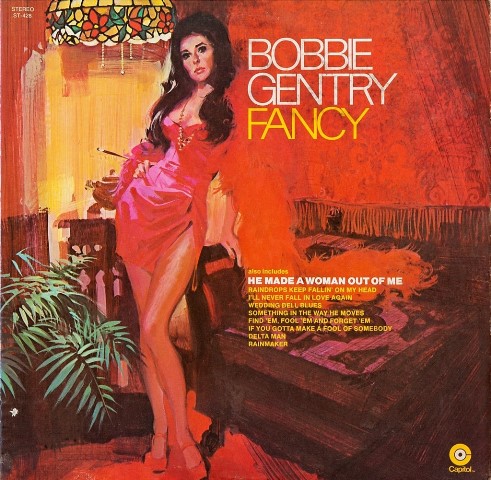In 2016, a writer from The Washington Post thought they had found Bobbie Gentry. After announcing their presence via the entry phone system of a gated housing development near Greenwood, Mississippi, they were told “there's nobody here by that name.” Though Greenwood was where Gentry had attended school and taught herself to play multiple instruments, it was a predictable response. She has been called “the JD Salinger of rock ’n’ roll.” Jill Sobule recorded the song “Where is Bobbie Gentry?” in 2009, the year BBC radio broadcast the documentary Whatever Happened to Bobbie Gentry?
The snippets above draw from the liner notes of The Girl From Chickasaw County, an exhaustive box set dedicated to Gentry’s years with Capitol Records. Evidently, she has had nothing to do with its compilation or production. The current received narrative for her emphasises the apparent reclusiveness while also stressing she was a pioneering female singer-songwriter, one responsible for the arresting 1967 hit single “Ode to Billie Joe”. She’s retreated, doesn’t give interviews and, seemingly, has no interest in revisiting the public-facing aspects of her own past.
 While the fascination with an ostensible mystery is understandable, especially in this mind-numbing age of contrastingly continuous, needless and obsessively solipsistic self-exposure, it overshadows and to a degree negates what generated the interest in the first place: the music. And The Girl From Chickasaw County is the place to come to discover why Gentry is and was special, and why her name echoes down the years.
While the fascination with an ostensible mystery is understandable, especially in this mind-numbing age of contrastingly continuous, needless and obsessively solipsistic self-exposure, it overshadows and to a degree negates what generated the interest in the first place: the music. And The Girl From Chickasaw County is the place to come to discover why Gentry is and was special, and why her name echoes down the years.
The Girl From Chickasaw County is very smart. As much so as the identically packaged Soft Cell box set covered last week by this column. Like that, also issued by Universal Music, a slipcase houses a full-colour hardback book and two foldout wallets containing the CDs, of which there are eight. Unlike the Soft Cell package, there is no DVD but a set of nice postcards is included.
Each of the first seven discs focuses on the albums she made for Capitol Records: Ode To Billie Joe (issued in August 1967), The Delta Sweete (February 1968), Local Gentry (August 1968), Bobbie Gentry & Glen Campbell (September 1968), Touch 'Em With Love (July 1969), Fancy (April 1970) and Patchwork (April 1971). All are appended with bonus tracks ranging from previously unheard alternate takes, demos and unreleased songs to non-album tracks from singles, foreign-language versions and songs performed on the BBC TV programmes the Tom Jones Show and Top of the Pops.
The eighth disc, Live at the BBC, collects 26 tracks recorded for her own BBC TV programmes in 1968, 1969 and 1971. Twelve of the cuts were issued on a Record Store Day album earlier this year. In total, the set includes 75 previously unreleased recordings. Nothing in the archives from the relevant period has escaped attention. Considering that this is a major-label release with a lot of effort put into it, it would have been good if her pre-Capitol releases and post-Capitol sides for Warners had been licensed in to make it a complete collection of Gentry’s music.
 Evidently, any Bobbie Gentry fan needs this. Fittingly, it reconfigures the narrative. In part, this is due the diligent archive disinterments but principally because of how the book is conceived. After an introductory text, the commentary is broken down into album-by-album sections digging into the particular periods. The core text is followed by an epilogue. Reading the text while listening to each disc is enlightening. (pictured left: Gentry in 1967 in an unused shot from the session for the cover of her debut album)
Evidently, any Bobbie Gentry fan needs this. Fittingly, it reconfigures the narrative. In part, this is due the diligent archive disinterments but principally because of how the book is conceived. After an introductory text, the commentary is broken down into album-by-album sections digging into the particular periods. The core text is followed by an epilogue. Reading the text while listening to each disc is enlightening. (pictured left: Gentry in 1967 in an unused shot from the session for the cover of her debut album)
No one is going to make the case that an alternate take of “Raindrops Keep Falling on my Head” or the Italian-language track “La Siepe” are essential, but taken together with the contextualising information what emerges is a confused overall picture. Take her third album from 1968, Bobbie Gentry & Glen Campbell. As the liner notes put it, it “was a clear bid by Capitol to revive her flagging commercial fortunes by pairing her with label mate and fellow ‘country’ star Glen Campbell for an album of [cover-version heavy] duets” and is “less artistically satisfying than Bobbie’s other releases, but it remains in part an enjoyable MOR listen.” Set this against the knowledge that she was, as the text attests, ambitious, self-determining, had studied music, had a pre-hit background in music and had been her own producer. Yet, still, she made this agreeable yet artistically bankrupt and water-treading album.
Then there’s the music biz pigeonholing of her as country. That goes so far but, really, the best of her own material is analogous with the nearly contemporary recordings by Tony Joe White: a soul-inflected, blues-edged southern pop. Furthermore, in finding analogies for her path the only comparable name – even though she emerged a little earlier and was writing songs for others to record – is the similarly southern-born Jackie DeShannon who also issued patchy albums bulked out with uninspired, workaday over versions. Perhaps, like DeShannon, Gentry was subject to what came with steering a path through a male-dominated music business.
 It’s also worth pondering her presentation as a female. The Rick Hall-produced Fancy album featured cover versions but – ignoring its awful “Raindrops Keep Falling on my Head” – flowed and is her best album after her debut and The Delta Sweete. The title song, around which the album hinges, is about “the beautiful Fancy [who] is groomed as a hooker by her sickly, impoverished mother. Escaping the grinding poverty of her childhood for a life of luxury, she ends up with an ‘elegant Georgia mansion’ and ‘a New York townhouse flat’ – and no shame or regrets.” Gentry is quoted as saying in 1974 that “‘Fancy’ is my strongest statement for women’s lib, if you really listen to it. I agree wholeheartedly with that movement and all the serious issues that [it stands] for – equality, equal pay, day care centres, and abortion rights.” On the album’s cover she appears in the guise of a prostitute (pictured right). On page four of the book, her pre-fame band The International Four are pictured on stage. She is wearing a bikini.
It’s also worth pondering her presentation as a female. The Rick Hall-produced Fancy album featured cover versions but – ignoring its awful “Raindrops Keep Falling on my Head” – flowed and is her best album after her debut and The Delta Sweete. The title song, around which the album hinges, is about “the beautiful Fancy [who] is groomed as a hooker by her sickly, impoverished mother. Escaping the grinding poverty of her childhood for a life of luxury, she ends up with an ‘elegant Georgia mansion’ and ‘a New York townhouse flat’ – and no shame or regrets.” Gentry is quoted as saying in 1974 that “‘Fancy’ is my strongest statement for women’s lib, if you really listen to it. I agree wholeheartedly with that movement and all the serious issues that [it stands] for – equality, equal pay, day care centres, and abortion rights.” On the album’s cover she appears in the guise of a prostitute (pictured right). On page four of the book, her pre-fame band The International Four are pictured on stage. She is wearing a bikini.
As intriguing is learning that in 1974 she was told by a network that she couldn’t sing “Fancy” in a US TV series and also instructed not to allow her male dancers to perform on screen in drag during a skit on the Andrews Sisters. Squaring these maybe conflicting circles and gaining an understanding of her exact positioning is impossible without Gentry’s input.
Nonetheless, whatever the imponderables, The Girl From Chickasaw County amply makes it clear that Gentry is a significant artist. Its bulk may initially make it seem like overkill, but this essential box set renders Bobbie Gentry more fascinating than ever.
- Next Week: Festival ‘69 – previously unheard live recordings by The Michael Gibbs Big Band and The Gary Burton Quartet














